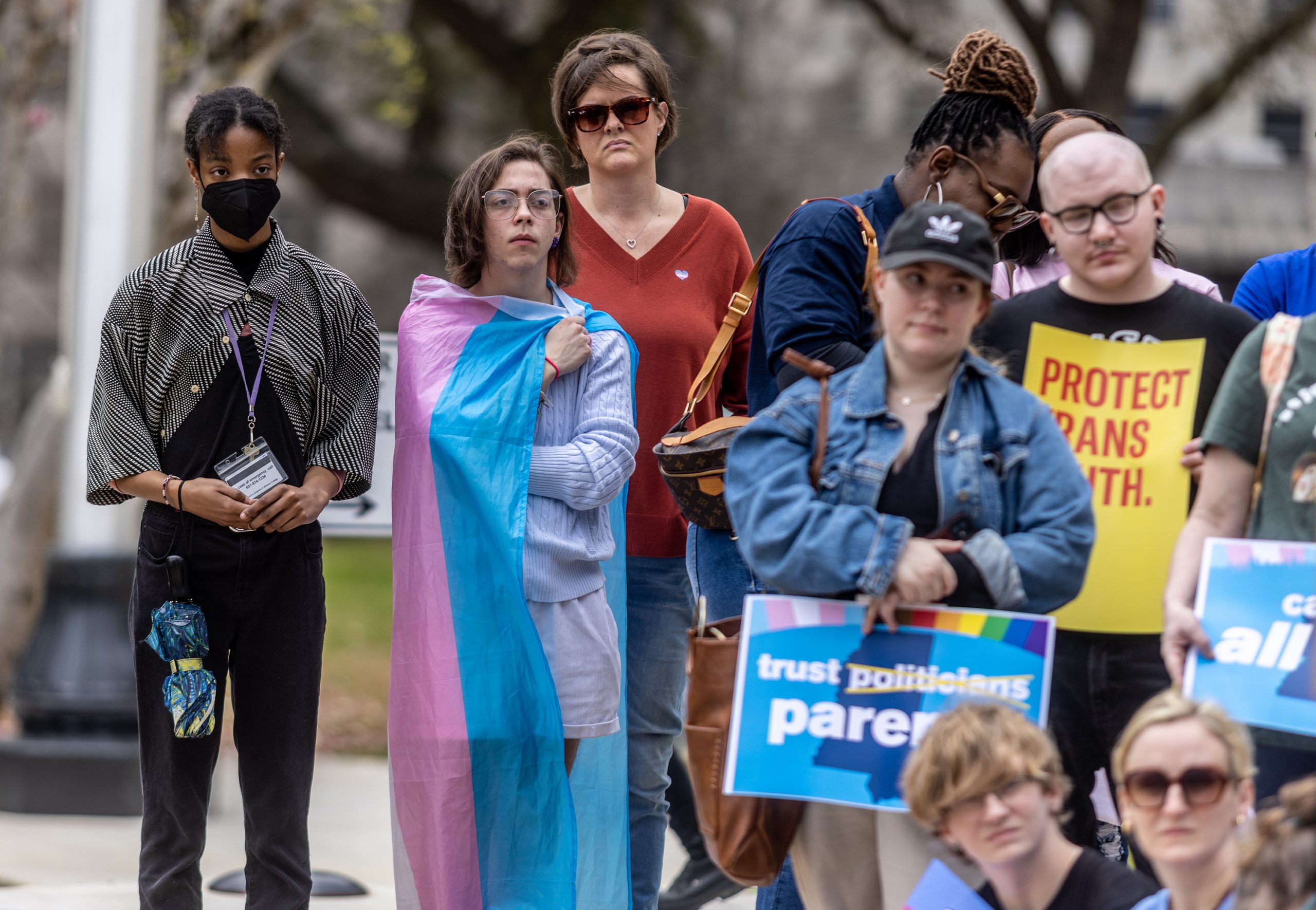Mississippi Today
‘What are we doing?’: Protesters say legislative focus on anti-trans bill misplaced amid health care crisis
‘What are we doing?’: Protesters say legislative focus on anti-trans bill misplaced amid health care crisis
Trans kids, supportive parents and activists from across Mississippi gathered on the south-facing steps of the Capitol on Wednesday to rally against a bill that would ban gender-affirming medical care for trans minors.
More than 50 people attended the protest against House Bill 1125, called the “Regulate Experimental Procedures for Adolescents Act,” holding colorful signs and wearing the pink, blue and white trans pride flags draped on their shoulders.

Some trans kids who attended, like Theodore Milnor, a 15-year-old freshman at Tougaloo Early College High School, had excused absences from school. Milnor’s counselor gave him one condition: To write a report on the protest and present it to the whole school for kids who couldn’t go.
Before the protest started, Milnor turned to a family friend, Tifani Keith, who’d come with him because his parents couldn’t get off work. He said he was anxious.
“We’re in a very safe and loving place right now,” Keith told him as they walked up the Capitol steps.
Inside the building, conservative lawmakers have fast-tracked HB 1125 without consulting trans kids or providers of gender-affirming care, an evidence-based form of treatment that is supported by every major medical association in the U.S. If the bill passes, providers could lose their license if they continue to treat trans kids, and anyone who “aids and abets” gender-affirming care for trans kids could be sued for damages for up to 30 years, in a provision modeled off a Texas anti-abortion bill.
“It is infantilizing, unfair, discriminatory and frankly unconstitutional,” said McKenna Raney-Gray, staff attorney for the American Civil Liberties Union of Mississippi’s LGBTQ Justice Project. “This is the kind of thing the ACLU was designed to fight against.”
The bill has yet to pass the Senate but it is backed by a powerful coalition of lawmakers, including Gov. Tate Reeves who has indicated he’ll sign it.
“The fact is that we set age restrictions on driving a car and on getting a tattoo,” Reeves said during his State of the State address. “We don’t let 11-year-olds enter an R-rated movie alone, yet some would have us believe that we should push permanent, body-altering surgeries on them at such a young age.”
Other lawmakers have likened gender-affirming care to child abuse and called the bill a measure to protect kids. But at the rally, speakers said the bill will do the exact opposite: by denying trans kids the opportunity to transition, they say HB 1125 will increase the risk of suicide among a population that is already disproportionately vulnerable to mental illness. Nationally, trans youth attempt suicide at a rate more than four times their cisgender peers due to social stigma and discrimination. Research has repeatedly shown that gender-affirming care significantly boosts the chances that trans kids will live to see adulthood.
READ MORE: What to know about gender-affirming care in Mississippi
Some of the trans kids who attended, like Milnor, have not started gender-affirming care but still view the bill as an attack on their rights.
“This bill is not about health care in my point of view,” he said. “I feel it is more about ostracizing trans people.”
Gender-affirming care is already difficult to obtain in Mississippi. There is likely only one clinic in the state that offers gender-affirming care, with parental consent, to 16- and 17-year-old trans teenagers. The number of kids in the state who have prescriptions to hormones or puberty blockers — treatment that is reversible — could likely fit in a whole classroom, according to in-state providers of gender-affirming care.
In speeches, House lawmakers like Rep. Nick Bain, R-Corinth, a co-sponsor of the bill, could not name a single instance of trans kids undergoing surgery in Mississippi. There is no clinic in Mississippi that offers gender-confirmation surgery to trans kids, according to providers.
“Believe me, the gentleman from Corinth did not come up with this idea one afternoon in the duck hunt,” said Clint Faulkner, a father who drove up from Sumrall with his child to attend the rally. “He got a call from a special interest group. … That’s what bothers me.”
Multiple speakers asked, rhetorically, why lawmakers are prioritizing HB 1125 instead of other health care issues in Mississippi, like the rural hospital crisis or the worsening rate of maternal mortality, one of the highest in America.
“My question, as always, is this,” said Lance Presley, a reverend at Broadmeadow United Methodist Church in Jackson. “Why is it that every time folks in this building start talking about protecting our children, it’s never about making sure that our children in this state have adequate nutrition, it’s never about making sure that the kids in this state live past childhood?”
“Why is it always – when they talk about protecting children – why is it always about hurting the kids who are already hurting most,” he continued.
Ashley Moore, the mother of a trans child, echoed Presley’s point.
“What are we doing?” she said. “We rank last in so many things, and we’re trying to take away our children’s rights? Gender-affirming care is evidence-based. Everybody seems to be overlooking that.”
Moore said that she was so scared to speak out against the bill she was shaking, but that, “I am even more terrified of what will happen to my child and my family if this is passed.”
Leviathan Myers-Rowell, a 16-year-old high school junior, talked about what it’s like to be a trans kid in Mississippi, an experience he said lawmakers don’t understand. He quoted a comment that Sen. Joey Fillingane, R-Sumrall, made in a Senate committee claiming that parents are forcing gender-affirming care on trans kids.
“This is horrifying to me because it just isn’t true,” Myers-Rowell said. “There are no parents out there who actually want to choose the gender assignment of their children … the reality is being trans is hard, and nobody chooses this.”
After speeches finished, protesters marched two blocks to the Governor’s Mansion, waving flags and chanting “protect trans youth.”
This article first appeared on Mississippi Today and is republished here under a Creative Commons license.
Did you miss our previous article…
https://www.biloxinewsevents.com/?p=208812
Mississippi Today
Hospitals see danger in Medicaid spending cuts
Mississippi hospitals could lose up to $1 billion over the next decade under the sweeping, multitrillion-dollar tax and policy bill President Donald Trump signed into law last week, according to leaders at the Mississippi Hospital Association.
The leaders say the cuts could force some already-struggling rural hospitals to reduce services or close their doors.
The law includes the largest reduction in federal health and social safety net programs in history. It passed 218-214, with all Democrats voting against the measure and all but five Republicans voting for it.
In the short term, these cuts will make health care less accessible to poor Mississippians by making the eligibility requirements for Medicaid insurance stiffer, likely increasing people’s medical debt.
In the long run, the cuts could lead to worsening chronic health conditions such as diabetes and obesity for which Mississippi already leads the nation, and making private insurance more expensive for many people, experts say.
“We’ve got about a billion dollars that are potentially hanging in the balance over the next 10 years,” Mississippi Hospital Association President Richard Roberson said Wednesday during a panel discussion at his organization’s headquarters.
“If folks were being honest, the entire system depends on those rural hospitals,” he said.
Mississippi’s uninsured population could increase by 160,000 people as a combined result of the new law and the expiration of Biden-era enhanced subsidies that made marketplace insurance affordable – and which Trump is not expected to renew – according to KFF, a health policy research group.
That could make things even worse for those who are left on the marketplace plans.
“Younger, healthier people are going to leave the risk pool, and that’s going to mean it’s more expensive to insure the patients that remain,” said Lucy Dagneau, senior director of state and local campaigns at the American Cancer Society.
Among the biggest changes facing Medicaid-eligible patients are stiffer eligibility requirements, including proof of work. The new law requires able-bodied adults ages 19 to 64 to work, do community service or attend an educational program at least 80 hours a month to qualify for, or keep, Medicaid coverage and federal food aid.
Opponents say qualified recipients could be stripped of benefits if they lose a job or fail to complete paperwork attesting to their time commitment.
Georgia became the case study for work requirements with a program called Pathways to Coverage, which was touted as a conservative alternative to Medicaid expansion.
Ironically, the 54-year-old mechanic chosen by Georgia Gov. Brian Kemp to be the face of the program got so fed up with the work requirements he went from praising the program on television to saying “I’m done with it” after his benefits were allegedly cancelled twice due to red tape.
Roberson sent several letters to Mississippi’s congressional members in weeks leading up to the final vote on the sweeping federal legislation, sounding the alarm on what it would mean for hospitals and patients.
Among Roberson’s chief concerns is a change in the mechanism called state directed payments, which allows states to beef up Medicaid reimbursement rates – typically the lowest among insurance payors. The new law will reduce those enhanced rates to nearly as low as the Medicare rate, costing the state at least $500 million and putting rural hospitals in a bind, Roberson told Mississippi Today.
That change will happen over 10 years starting in 2028. That, in conjunction with the new law’s one-time payment program called the Rural Health Care Fund, means if the next few years look normal, it doesn’t mean Mississippi is safe, stakeholders warn.
“We’re going to have a sort of deceiving situation in Mississippi where we look a little flush with cash with the rural fund and the state directed payments in 2027 and 2028, and then all of a sudden our state directed payments start going down and that fund ends and then we’re going to start dipping,” said Leah Rupp Smith, vice president for policy and advocacy at the Mississippi Hospital Association.

Even with that buffer time, immediate changes are on the horizon for health care in Mississippi because of fear and uncertainty around ever-changing rules.
“Hospitals can’t budget when we have these one-off programs that start and stop and the rules change – and there’s a cost to administering a program like this,” Smith said.
Since hospitals are major employers – and they also provide a sense of safety for incoming businesses – their closure, especially in rural areas, affects not just patients but local economies and communities.
U.S. Rep. Bennie Thompson is the only Democrat in Mississippi’s congressional delegation. He voted against the bill, while the state’s two Republican senators and three Republican House members voted for it. Thompson said in a statement that the new law does not bode well for the Delta, one of the poorest regions in the U.S.
“For my district, this means closed hospitals, nursing homes, families struggling to afford groceries, and educational opportunities deferred,” Thompson said. “Republicans’ priorities are very simple: tax cuts for (the) wealthy and nothing for the people who make this country work.”
While still colloquially referred to as the One Big Beautiful Bill Act, the name was changed by Democrats invoking a maneuver that has been used by lawmakers in both chambers to oppose a bill on principle.
“Democrats are forcing Republicans to delete their farcical bill name,” Senate Democratic Leader Charles Schumer of New York said in a statement. “Nothing about this bill is beautiful — it’s a betrayal to American families and it’s undeserving of such a stupid name.”
The law is expected to add at least $3.3 trillion to the nation’s debt over the next 10 years, according to the most recent estimate from the Congressional Budget Office.
This article first appeared on Mississippi Today and is republished here under a Creative Commons Attribution-NoDerivatives 4.0 International License.
The post Hospitals see danger in Medicaid spending cuts appeared first on mississippitoday.org
Note: The following A.I. based commentary is not part of the original article, reproduced above, but is offered in the hopes that it will promote greater media literacy and critical thinking, by making any potential bias more visible to the reader –Staff Editor.
Political Bias Rating: Center-Left
This article reports on the negative impacts of a major federal tax and policy bill on Medicaid funding and rural hospitals in Mississippi. While it presents factual details and statements from stakeholders, the tone and framing emphasize the harmful consequences for vulnerable populations and health care access, aligning with concerns typically raised by center-left perspectives. The article highlights opposition by Democrats and critiques the bill’s priorities, particularly its effect on poor and rural communities, suggesting sympathy toward social safety net preservation. However, it maintains mostly factual reporting without overt partisan language, resulting in a moderate center-left bias.
Crooked Letter Sports Podcast
Podcast: The Mississippi Sports Hall of Fame Class of ’25
The MSHOF will induct eight new members on Aug 2. Rick Cleveland has covered them all and he and son Tyler talk about what makes them all special.
Stream all episodes here.
This article first appeared on Mississippi Today and is republished here under a Creative Commons Attribution-NoDerivatives 4.0 International License.
The post Podcast: The Mississippi Sports Hall of Fame Class of '25 appeared first on mississippitoday.org
Mississippi Today
‘You’re not going to be able to do that anymore’: Jackson police chief visits food kitchen to discuss new public sleeping, panhandling laws
Diners turned watchful eyes to the stage as Jackson Police Chief Joseph Wade took to the podium. He visited Stewpot Community Services during its daily free lunch hour Thursday to discuss new state laws, which took effect two days earlier, targeting Mississippians experiencing homelessness.
“I understand that you are going through some hard times right now. That’s why I’m here,” Wade said to the crowd. “I felt it was important to come out here and speak with you directly.”
Wade laid out the three bills that passed earlier this year: House Bill 1197, the “Safe Solicitation Act,” HB 1200, the “Real Property Owners Protection Act” and HB 1203, a bill that prohibits camping on public property.
“Sleeping and laying in public places, you’re not going to be able to do that anymore,” he said. “There’s a law that has been passed that you can’t just set up encampments on public or private properties where it’s a public nuisance, it’s a problem.”
The “Real Property Owners Protection Act,” authored by Rep. Brent Powell, R-Brandon, is a bill that expedites the process of removing squatters. The “Safe Solicitation Act,” authored by Rep. Shanda Yates, I-Jackson, requires a permit for panhandling and allows people to be charged with a misdemeanor if they violate this law. The offense is punishable by a fine not to exceed $300 and an offender could face up to six months in jail. Wade said he’s currently working with his legal department to determine the best strategy for creating and issuing permits.
“We’re going to navigate these legal challenges, get some interpretations, not only from our legal department, but the Attorney General’s office to ensure that we are doing it legally and lawfully, because I understand that these are citizens,” he said. “I understand that they deserve to be treated with respect, and I understand that we are going to do this without violating their constitutional rights.”
Wade said the Jackson Police Department is steadily fielding reports of squatters in abandoned properties and the law change gives officers new power to remove them more quickly. The added challenge? Figuring out what to do with a person’s belongings.
“These people are carrying around what they own, but we are not a repository for all of their stuff,” he said. “So, when we make that arrest, we’ve got to have a strategic plan as to what we do with their stuff.”
Wade said there needs to be a deeper conversation around the issues that lead someone to becoming homeless.
“A lot of people that we’re running across that are homeless are also suffering from medical conditions, mental health issues, and they’re also suffering from drug addiction and substance abuse. We’ve got to have a strategic approach, but we also can’t log jam our jail down in Raymond,” Wade said.
He estimates that more than 800 people are currently incarcerated at the Raymond Detention Center, and any increase could strain the system as the laws continue to be enforced.
“I think there’s layers that we have to work through, there’s hurdles that we are going to overcome, but we’ve got to make sure that we do it and make sure that my team and JPD is consistent in how we enforce these laws,” Wade said.
Diners applauded Wade after he spoke, in between bites of fried chicken, salad, corn and 4th of July-themed packaged cakes. Wade offered to answer questions, but no one asked any.
Rev. Jill Buckley, executive director of Stewpot, said that the legislation is a good tool to address issues around homelessness and community needs. She doesn’t want to see people who are homeless be criminalized, but she also wants communities to be safe.
“I support people’s right to self determine, and we can’t impose our choices on other people, but there are some cases in which that impinges on community safety, and so to the extent that anyone who is camping or panhandling or squatting and is a danger to themselves and others, of course, I fully support that kind of law. I don’t support homelessness being criminalized as such,” Buckley said.

Many of the people Wade addressed while they ate Thursday said they have housing, don’t panhandle, and shouldn’t be directly impacted by the legislation. But Marcus Willis, 42, said it would make more sense if elected officials wanted to combat the negative impacts of homelessness that they help more people secure employment.
“There ain’t enough jobs,” said Willis, who was having lunch with his girlfriend Amber Ivy.
The two live in an apartment together nearby on Capitol Street, where Ivy landed after her mother, whom Ivy had been living with, suffered a stroke and lost the property. Similarly, Willis started coming to eat at Stewpot after his grandmother, whose house he used to visit for lunch, passed away.
Willis holds odd jobs – cutting grass, home and auto repair – so the income is inconsistent, and every opportunity for stable employment he said he’s found is outside of Jackson in the suburbs. The couple doesn’t have a car.
Making rent every month usually depends on their ability to find someone to help chip in, said Ivy, who is in recovery from substance abuse. She said she’s watched problems surrounding homelessness grow over the years in Jackson. Ivy grew up near Stewpot and has lived in various neighborhoods across the city – except for the times she moved out of state when things got too rough.
“There was just moments where I just had to leave,” Ivy said. “Sometimes if you hit a slump here, there’s almost no way for you to get out of it.”
This article first appeared on Mississippi Today and is republished here under a Creative Commons Attribution-NoDerivatives 4.0 International License.
The post 'You're not going to be able to do that anymore': Jackson police chief visits food kitchen to discuss new public sleeping, panhandling laws appeared first on mississippitoday.org
Note: The following A.I. based commentary is not part of the original article, reproduced above, but is offered in the hopes that it will promote greater media literacy and critical thinking, by making any potential bias more visible to the reader –Staff Editor.
Political Bias Rating: Center-Right
This article primarily reports on new laws in Jackson, Mississippi, targeting public sleeping, panhandling, and squatting, focusing on statements by Police Chief Joseph Wade and community perspectives. The coverage presents the legislative measures—authored by Republican and independent lawmakers—with a tone that emphasizes law enforcement challenges and community safety, reflecting a conservative approach to homelessness as a public order issue. While it includes voices concerned about criminalization and the need for social support, the overall framing centers on law enforcement and property protection. The article maintains factual reporting without overt editorializing but leans slightly toward a center-right perspective by highlighting legal enforcement as a solution.
-
News from the South - Arkansas News Feed7 days ago
Real-life Uncle Sam's descendants live in Arkansas
-
News from the South - Georgia News Feed6 days ago
'Big Beautiful Bill' already felt at Georgia state parks | FOX 5 News
-
News from the South - Oklahoma News Feed6 days ago
LOFT report uncovers what led to multi-million dollar budget shortfall
-
Local News6 days ago
Maroon Tide football duo commits to two different SEC Teams!
-
The Center Square4 days ago
Here are the violent criminals Judge Murphy tried to block from deportation | Massachusetts
-
Mississippi News Video7 days ago
Today’s First Alert Weather Kid is Ashlyn (7/4)
-
News from the South - South Carolina News Feed7 days ago
South Carolina lawmakers react as House approves Trump’s sweeping economic package
-
News from the South - Texas News Feed6 days ago
Hill Country flooding: Here’s how to give and receive help


















































